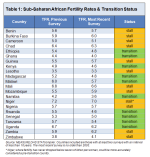Here's some countries where the decline in fertility rates has stalled:
https://data.worldbank.org/indicator/SP.DYN.TFRT.IN?end=2016&locations=CR-BN-KW-IE-MD
Ireland in the 1960s
Poland in the 1970s
Costa Rica and Brunei Darussalam in the 1980s
Kuwait in the 1990s.
Today, all of them have TFRs below 2.0
Yes, those are hand-picked examples. They suffice to show, though, that panicking is not the appropriate response when some individual country's fertility rate doesn't seem to move much for 5 or 10 years. Sure, analyse the causes: have improvements in (female) education and access to the labour market stalled? Is infant mortality remaining unusually high? Is a large majority of the population stuck in abject poverty? Sure,
treat those causes -- all of them are worthy goals in their own right.
But the cultural essentialism that asserts that the sole, or primary, cause is "cultural preferences for larger families" or some such is, essentially (pun intended), the racism of the politically correct. It's also a bad case of philosophical idealism. Karl Marx may have been wrong about many things, but he was right about one thing:
Das Sein bestimmt das Bewusstsein ("existence determines consciousness"). Back in the days when large families were a global phenomenon, so were cultural preferences for large families - and families started to get smaller before the preferences shifted!
Saying that Africans won't undergo the demographic transition because they have cultural norms that are incompatible with it is in effect amounts to saying that African cultures are static, unlike those of Iranians, Costa Ricans, Colombians, Thais, and many other groups who have undergone the transition despite whatever the cultural norms may have been 50 years ago, and before them Europeans. From there, it's not a long leap to conclude that Africans aren't cultural beings in the same sense other humans are, that, unlike
us, they're congenitally incapable of shedding the biological urge to procreate.
That glee with which this alleged stall of the fertility decline in Africa is sometimes reported smells heavily of saying "told ya those n*****s can't but breed like rabbits, it's in their blood", covered in a thin veneer of political correctness.
It's also factually wrong. One word:
Djibouti.
This small country at the Horn of Africa has a total fertility rate somewhere between 2.3 (
2017 CIA estimate) and 2.8 (
2016 World Bank estimate). Around 60% of its population are ethnic Somali, most of the rest are Afar, a group also found in neighboring regions of Ethiopia and Eritrea. Somalia has a TFR or 5.8 (CIA 2017) to 6.3 (World Bank 2016, which would make it the world's second highest after Niger), Ethiopia and Eritrea have between 4 and 5. If cultural norms, rather than the volatile situation, poverty, and lack of education, where the driver behind a high fertility rate, Djibouti's is less than half what it should be.


